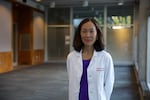Dr. Esther Choo remembers the first time she dealt with a critically ill patient who rejected care from a physician of color.
She still remembers the feeling of walking away with a pit in her stomach — of feeling isolated. Choo, who is Asian-American, says it has stuck with her ever since.
"You walk into patients' rooms and you wonder: Is this going to happen to me again?" Choo said. "Or are people not saying it but are thinking the same thing? That because I'm of a certain background that I'm really not equipped to take care of them?"
And then it happened again. And again.

Dr. Esther Choo is an emergency medicine doctor and associate professor for the Department of Emergency Medicine at the OHSU School of Medicine.
Ericka Cruz Guevarra / OPB
Sometimes, a patient would choose to opt out of receiving care from her before requesting help from a white intern instead.
Other times, she'd undress a patient and find Nazi symbols tattooed on their bodies.
For years, Choo, an emergency physician and associate professor at Oregon Health & Science University, didn't talk about it with anyone.
In emergency departments, which usually have just a few physicians working at one time, there wasn't always a direct peer or physician of color to turn to and ask, "Has this happened to you, too?"
But earlier this week, Choo made headlines when she decided to talk about it.
After the deadly white supremacist rally in Charlottesville, Virginia, Choo tweeted about the way white supremacy has trickled into her work as an Asian-American doctor in Oregon. More than 24,000 people have since retweeted her.
1/ We've got a lot of white nationalists in Oregon. So a few times a year, a patient in the ER refuses treatment from me because of my race.
— Dr. Esther AT LEAST WEAR A MASK Choo (@choo_ek) August 13, 2017
"For me, it made me feel like this is a moment to share experiences of racism, and show that they follow us everywhere we go," Choo said.
Choo said she's developed over time her own way of separating a patient's intolerance from what she knows of herself and her practice. But in an op-ed published Saturday morning, Choo wrote about the obligations the health care industry has to its clinicians who face racism. They're obligations that she says, if met, translate into better health care.
"Now that I'm in my mid-career I'm so much more able to deal with it," Choo said. "But I know that the younger physicians are not, and our medical trainees, our students and our residents may be encountering it for the first time. We do them a disservice by not letting them know that this can happen, and preparing them for it."
Related: Hundreds Take To 2 Portland Bridges, March In Solidarity With Charlottesville
Choo said "surprise" is the wrong word to describe her reaction to the events in Charlottesville. She knows from her day-to-day experiences that racism has never really gone away.
The events in Charlottesville have largely focused on black-white relations in the United States. The rally was organized around the proposed removal of a statue honoring Confederate Gen. Robert E. Lee.
Choo said she thinks Charlottesville has "opened the floodgates" — that the outpouring of recognition from other health care providers of color has reminded her that there are toxic experiences many providers face that have never really been widely discussed.
"I think people do assume that Asians have a sort of special or protected experience in the United States. It's the old model minority myth, and I think I bought into that myth too," she said.
"What surprises me going through hospitals is that there is still prejudice against Asian-Americans."
Choo said she's not interested in oppression Olympics, or in comparing the experiences of one minority with another. She's interested in speaking up, and in showing through action that silence is just as damaging as hurtful speech.
"As I watch the comments on Twitter and other social media around this topic, I feel like other physicians feel the same way, that it's kind of emboldened everybody to say, 'I'm witnessing this racism — everybody is kind of focused on racism because of Charlottesville, so let me tell my piece of that story.'"